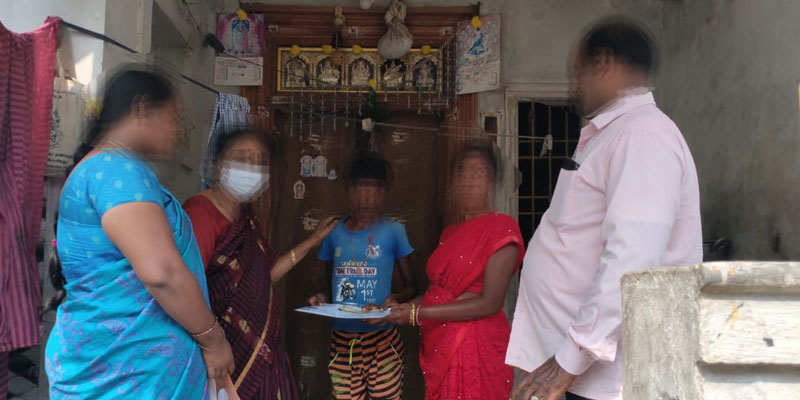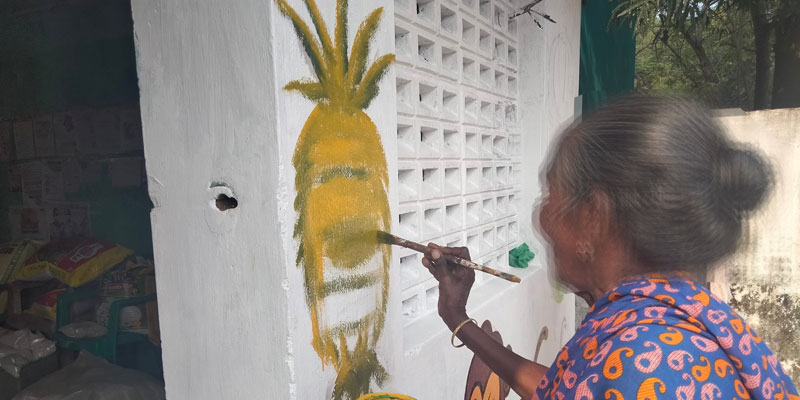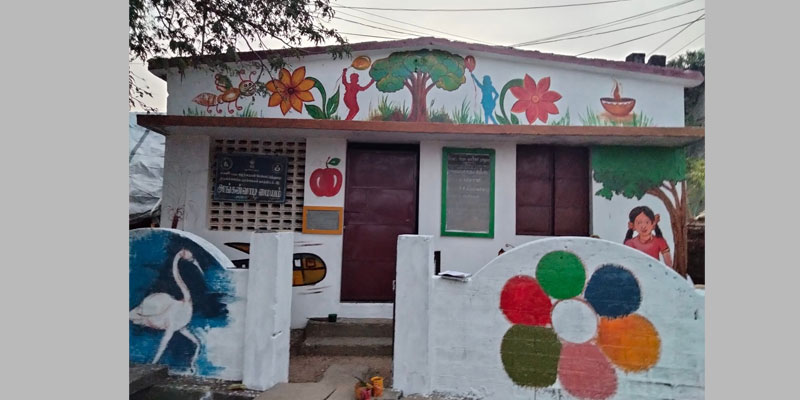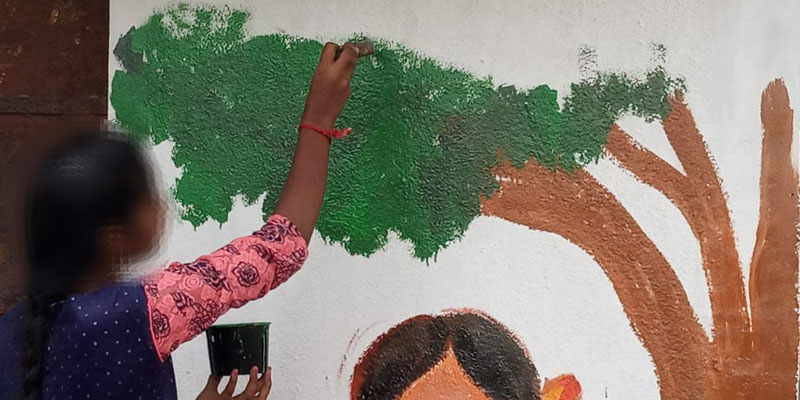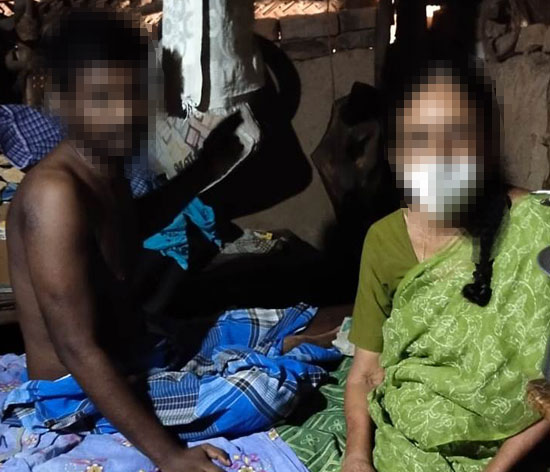
Arun’s life was shattered two years ago. A severe spinal cord injury left the 26-year-old resident of Puducherry’s Kothapurinatham village with paraplegia (lower-body paralysis), an incurable condition. His agony grew as he developed a fourth-stage bedsore and persistent bladder drainage. The dire financial circumstances at home meant that his family could not even afford the colostomy bag he needed. Faced with the prospect of lifelong immobility and pain, Arun had nearly lost all hope of getting better.
In a sharp turnaround, Arun is able to stand and sit upright today. He manages his own hygiene needs, and his confidence has also grown immensely with his improving health. It’s all been possible due to Project Sanjeevan, a palliative care initiative launched in March 2020 by the non-profit Sri Aurobindo Society (SAS) with support from the Tata Trusts.
On learning of Arun’s condition, the Sanjeevan team went to his home with medicines, a catheter kit, a colostomy bag, a food kit, and dressing materials. The team also taught his mother to properly dress his wounds, prepare sterile dressing materials and change the catheter. Physiotherapy sessions have enabled Arun to improve his mobility, while psychological care has helped him regain a positive outlook on life.
Sanjeevan fills a critical healthcare gap in the union territory of Puducherry, including its main town and five neighbouring villages. Although the region has around a million residents, home-based pain management and palliative care services for the incurably and terminally ill, chronically bedridden and the elderly did not exist until Sanjeevan arrived.
Unfortunately, this is a common story across India. With less than 2% of India’s population in need of palliative care having access to it, millions of patients are forced to live out their days in intense discomfort. They’re not the only ones affected. “The lack of access to palliative care puts undue stress on patients’ families and care-givers and leads to the improper use of scarce resources and hospital beds meant for curative therapy,” says Dr Suresh Kumar, director of Sanjeevan Palliative Care.
Within Puducherry, Sanjeevan is bridging that gap by providing community-based home care services to around 3,000 patients over a five-year duration. The project’s ultimate goal is to showcase a compassionate community model of palliative care for low- and middle-income countries and to establish Sanjeevan as a centre of excellence for palliative care.
Touching lives, providing dignity
The ingenuity of Sanjeevan’s healthcare model is its community-based approach. While the team tends to the patients’ physical, psychological, social, emotional and spiritual needs, it also sensitises and empowers people in the patient’s neighbourhood to look after them at home. An army of community volunteers, local doctors, nurses, health and social workers, police personnel and others has also been trained to help patients and their families.
Since 2020, the project team has organised 300 sensitisation programmes and 60 volunteer-training programmes. Twenty training sessions have also been conducted to build the capacity of doctors, nurses, health workers and social workers in the area.
Volunteers play a vital role in driving the initiative. As on March 2023, 1,846 volunteers have been trained by Sanjeevan’s team. These individuals support the initiative by visiting patients, arranging food and medicines, helping with the latter’s hygiene and care, referring patients to the hospital and supporting Sanjeevan’s team as needed. In addition, Sanjeevan has set up three nurse-led home care units supervised by doctors trained in palliative care. Tie-ups with medical institutions in the area help facilitate home care programmes for the patients.
These interventions have been life-changing for patients like 15-year-old Mahesh from Kaduvanur village. A cancer patient, Mahesh’s condition was deteriorating due to the lack of a proper diet and his family’s financial problems. The Sanjeevan team provided relief in the form of medication, psychological support, and financial aid. The team also taught Mahesh’s mother how to prepare nutritious meals and ensure basic hygiene.
The support has considerably improved Mahesh’s quality of life. The assistance facilitated by Sanjeevan has enabled him to continue his schooling. Today, he is a classic example of how timely palliative care can significantly enhance the quality of life of patients.
Using art as therapy
A unique dimension of Sanjeevan’s approach is its painting workshops, which represent a holistic and art-based approach towards healthcare. Organised at government schools and Anganwadis, these workshops allow patients and their family members to express themselves creatively. They also promote feelings of relaxation and joy. In addition, the brightly-painted buildings give the community feelings of pride and ownership.
The community’s appreciation of the initiative has encouraged the project team. “The positive feedback from patients and community members has reinforced the importance of incorporating such creative and artistic activities into our healthcare programmes,” says Vetri Selvan, project coordinator, Sanjeevan.
Uma’s delightful experience with the painting workshop is tinged with bittersweet significance. Says the patient from Ariyankuppam village: “I am happy that these paintings will last for a long time, and that my family and neighbours will remember and appreciate my artwork whenever they see my paintings on the wall.”
Leaving an impact
Having built a solid foundation for community-based palliative healthcare in Puducherry, the Sanjeevan team wants to ensure that this impact is sustained in the coming years. In this direction, SAS will organise trained volunteers into village level committees. At the end of the Sanjeevan programme, these committees will take over all the administrative responsibilities and carry on the effort, with hand-holding from SAS.
The team has also set in motion policy-level changes. With Sanjeevan’s support, a state-level Palliative Care policy has been drafted and adopted by the Government of Puducherry. The Policy will help end-of-life care to be mainstreamed into the existing health and social welfare system, and recognise palliative care as an integral part of every person’s right to life and good health. That will be Sanjeevan’s enduring legacy.
(All patients’ names have been changed in the article)
